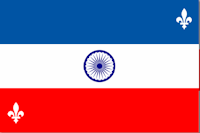Pondicherry - History
 Pondicherry was the seat of French empire in India. This empire, founded in 1749 by M. Dupleix, presented for some time a brilliant aspect, and, seconded by native alliances, threatened to subvert the foundations of the British power in the East. In 1670 the East India Company formed by Colbert founded Pondicherry, which became the capital of extensive possessions in the East Indies. At the beginning of the eighteenth century France nad extensive settlements in Canada, Nova Scotia and Newfoundland, the most flourishing of the West India Islands, and she seemed to have a prosperous career before her in India. In time, however, the rival interests of British and French colonists brought about a conflict which terminated in the loss of Canada and other North American possessions, as well as many of the West India Islands, while the dominion of India passed into the hands of the British.
Pondicherry was the seat of French empire in India. This empire, founded in 1749 by M. Dupleix, presented for some time a brilliant aspect, and, seconded by native alliances, threatened to subvert the foundations of the British power in the East. In 1670 the East India Company formed by Colbert founded Pondicherry, which became the capital of extensive possessions in the East Indies. At the beginning of the eighteenth century France nad extensive settlements in Canada, Nova Scotia and Newfoundland, the most flourishing of the West India Islands, and she seemed to have a prosperous career before her in India. In time, however, the rival interests of British and French colonists brought about a conflict which terminated in the loss of Canada and other North American possessions, as well as many of the West India Islands, while the dominion of India passed into the hands of the British.
Although the French were skilful in their negotiations with the native powers, their intolerant spirit led them to refuse to the people the free exercise of their religion, which must have rendered it next to impossible for them to hold any large territorial possessions. In fact, towards the close of the war of 1756, Pondicherry fell into the hands of the British; and, though restored by subsequent treaties, never, on the renewal of war, made any effectual resistance.
Pondicherry was founded by Francois Martin in 1674. As a result of wars between various European powers in India and sometimes owing to vicissitudes of wars in Europe, Pondicherry changed hands often in the 16th and the 17th centuries. In 1761 it fell into the hands of the English who retained control over it for 23 years. It may be mentioned in passing that neither the Dutch nor the English replaced the French law prevalent in the Establishment by their own laws. After a series of such changes in possession it was restored to the French in 1816 under the terms of the Treaty of Paris, 1814.
Pondicherry was raised by the French from a village to be the handsomest European city in India. It contained many fine houses in the European style; and the high culture of the vicinity, the numerous canals crossed by neatly constructed bridges, the roads planted with trees, and partly adorned by statues, gave to the surrounding district the appearance of a great garden. The inhabitants have suffered much by repeated hostilities, and, being unfavourably situated for trade, have been unable to retrieve their affairs. In this last respect, Pondicherry is surpassed by Cuddalore, a well-built town, at the mouth of a considerable river. In war, it followed the fortunes of Pondicherry; though its capture in 1783 was not effected without very great loss on the part of the British.
The chief colonial possessions of France were: in India, Pondicherry, and a few other small territories; Cochin-China, Tonquin, and the protectorates of Anam and Cambodia in Southeastern Asia. Among the colonies of the French was one known as the French Establishments in India. They consisted of five small units. Three of them, including Pondicherry, the largest of the units, were on or near the south east coast of India, one was on the west coast, and the fifth near Calcutta in the north. That there was no geographical contiguity is too obvious to be mentioned. There was also linguistic diversity. In Pondicherry and Karaikal on the east coast the inhabitants spoke Tamil.
In spite of these diversities the people of these several units appeared to have been not too displeased with being French Indians until recently, when, inspired by happenings in British India, a sizeable section of the people desired and agitated for independence. The solidarity among the people of the French Establishments appears to have been mainly due to the French character which inclined to emphasise the attributes of equality and legality and to a greater extent than in British India, those of fraternity and liberty as well. The territories passed from French to Indian control in a series of events between 1947 and 1954.
The De-jure transfer was completed in August 1962. Puducherry became a Union Territory in 1963 comprising four regions. The French first set foot here in 1670 and left a part of them when their undisturbed rule finished in 1954. Not much has changed since. The history has become punctuated. The air filled with nostalgia and the present is living up to a heritage that speaks so much. A trip to Puducherry is like a journey in time with a vibrant present celebrating its interesting past. “History goes back to the Roman times, but factually started with the arrival of the French in 1963, who founded the town and built it in its present form, during the two and a half century they occupied it.”
|
NEWSLETTER
|
| Join the GlobalSecurity.org mailing list |
|
|
|

